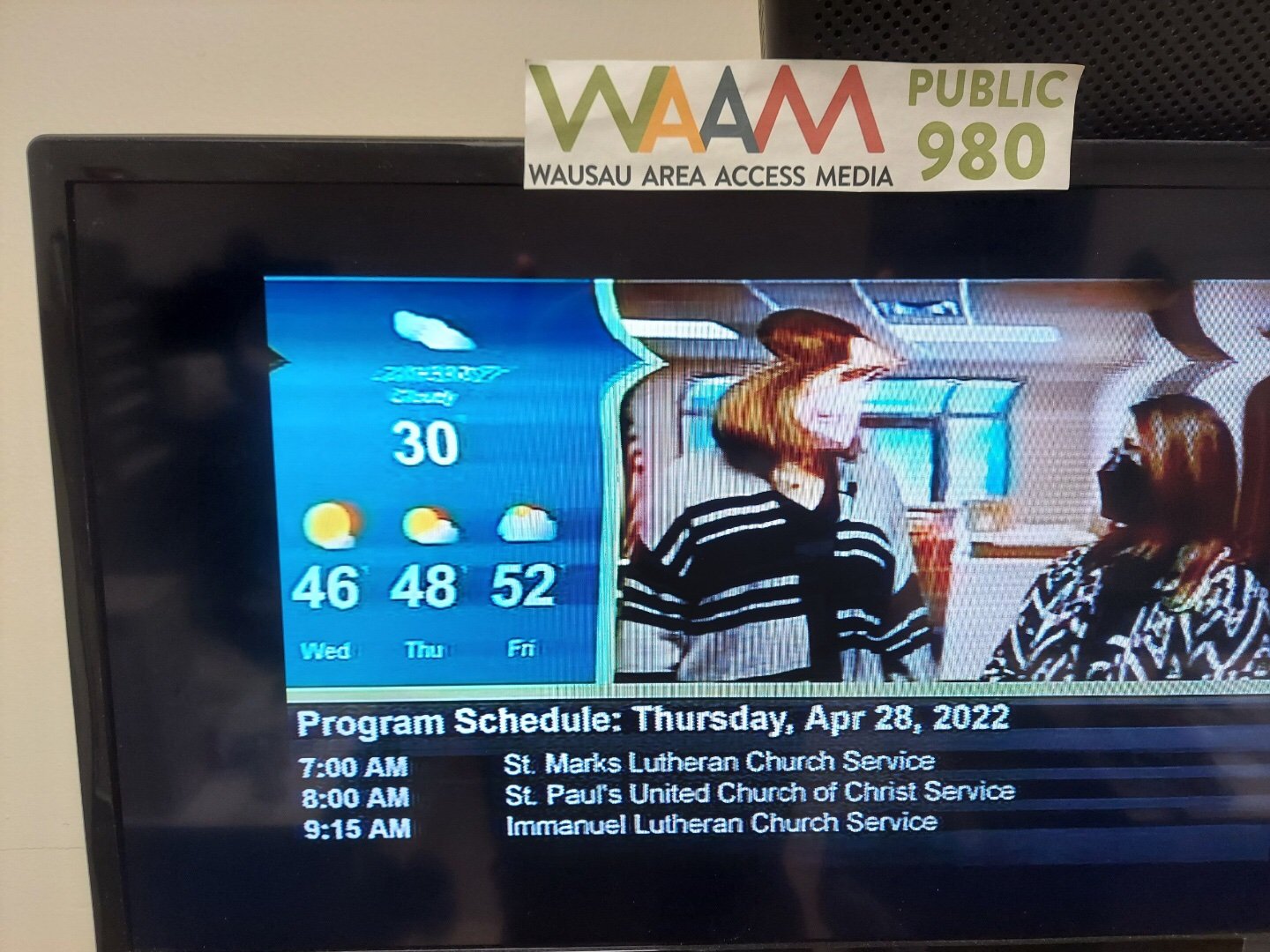Communication companies are in a special position because a democracy depends on people being well-informed so that they can “rule themselves” responsibly.
Without PEG channels, cable systems would be entirely closed to the public.
DOWNLOAD DOC
MORE ONLINE
January 2020:
Video Service Providers get reduction in fees in state budget. Read the Latest.
ADVOCACY ARCHIVE (previous posts)
Charter Spectrum is demanding municipalities pay monthly for modern signal carriage
May 4, 2022. Signal problems are cropping up all over the state on PEG (public, education, and government access) channels carried by Charter Spectrum. The culprit? Transmission equipment designed for the 20th century is giving out and Charter Spectrum is dragging its feet on upgrades – even though the company gets to dictate the terms -- terms that include paying for not only specific transmission equipment but also line upgrades. And while the new “edge” equipment can carry an HD signal, Charter Spectrum told one municipality last week that if it wants its programs broadcast in HD, it will have to pay for it on a monthly basis.
Wisconsin law does not allow a video service provider to charge municipalities for the transmission of PEG channels, although it can charge its subscribers a “transport fee” to “recover its costs to provide transmission capacity.” But that is not stopping Charter Spectrum. If a city wants more than old, outdated SD carriage, the company is insisting that it pay. Charter Spectrum told the City of Oshkosh last week that municipalities that want HD channel carriage will be charged $780/month or $9,360 per year per channel. If all 53 WCM station members signed up for one HD channel, Charter Spectrum would earn a half million dollars per year from municipalities. This in addition to the cost of new transmission equipment, which Charter Spectrum recently quoted at $9,300 each, and whatever Charter Spectrum decides to charge for line upgrades.
Concern is growing to alarm among PEG channelholders as decades-old modulators fail more and more often and old lines need more maintenance. Some problems requiring Charter Spectrum’s attention have been relatively minor. Most recently Wausau’s signal on channel 980 had “image ripping” problems. An email to Charter Spectrum’s Government Affairs Director went unanswered for two weeks. The signal finally cleared a few days after the problem was “escalated.” Another brief outage occurred in early April, when Oregon OCA Media had a two-day black out on Channel 984 and no audio on Channel 983 until it was resolved by the company. Stoughton WSTO’s audio went out at the same time.
But the City of Merrill’s channel has been off the air since Christmas. Its 30-year-old transmission equipment just stopped working. The situation is similar to what happened in Rice Lake and Oshkosh last fall, but in those cases, the situation was resolved in a few weeks with replacement equipment and a successful repair. The City of Merrill has not been able to fix its equipment or find a replacement. Now Charter Spectrum is telling the city that if it wants its channel back on the air, it will have to purchase new transmission equipment and upgrade its lines. The cost, according to the company -- unknown. When? Also unknown, but at least six months. When the City of Green Bay faced the same situation, it decided to drop its channels.
You might wonder why PEG stations are still using transmission equipment that has not been sold “new” in stores since somewhere around the turn of the century. It’s because Wisconsin law requires municipalities to use transmission equipment that is compatible with the video service provider’s system. This old equipment is, very unfortunately, what is compatible with Charter Spectrum’s system. Under Wisconsin law, video service providers are not required to upgrade their systems. Rather they are allowed to choose “the most economically and technologically efficient means of providing such [PEG channel] transmission capacity.” This statutory language has enabled video service providers to leave PEG channels behind in the 20th century. When transmission equipment, sometimes called “edge devices” or modulators, break, like they did last fall in Rice Lake and Oshkosh, city officials must scramble to find an old model from somewhere that will work. Under state law, it is the city’s responsibility to find something -- not the video service provider’s.
Concerned that the old modulators could stop working at any time and desiring to get HD, various municipalities have been talking with Charter Spectrum about upgrades for many years. Over the last few years, the interaction unfolds much the same everywhere. Charter Spectrum is informed that an upgrade is needed, a survey arrives weeks or months later that is to be filled out. Sometimes the company sends a technician out to do a site check, but not always. Then the company informs the city that the new equipment will need to be a particular model and that if it wants the upgraded equipment, it will also need to pay for upgrades to the line that connects the channel to the cable company headend. While Wisconsin law requires video service providers to maintain the lines to PEG channel facilities that were in existence in January 2008, in Charter Spectrum’s opinion, “maintaining” is not the same as making necessary upgrades to be compatible with edge devices currently available on the market. So, municipalities must choose. Continue to use decades-old transmission equipment that could break at any time or agree to Charter Spectrum’s price point for both modern equipment and transmission lines.
You might be thinking that the cities that agree to Charter Spectrum’s terms get the upgrade in a timely manner. But you would be wrong. The months are stretching out for many Wisconsin cities.
In April of 2021, the City of Whitewater was working on an upgrade of its internal broadcast system, excited about being able to offer its residents the ability to view meetings live as well as participate remotely. But then its IT department discovered that without an upgrade to the cable TV transmission equipment, the city would lose the ability to go live. So the City contacted Charter Spectrum right away and asked for an upgrade by June – in two months -- when its new system would be ready. The city heard nothing. In June, instead of completing the upgrade, the company sent the city a survey. Then nothing for six months. In November 2021 a Charter Spectrum representative told the city the upgrade was being “made a priority.” Two months later in January the company suddenly sent the city a contract to sign. The contract said it would be another six months before the project would be completed. It has now been over a year.
The City of Janesville has also been waiting months. After agreeing to an initial quote, the city expected the upgrade to be in the works. Instead, months later when they finally heard from Charter Spectrum again, the company said it would need more money – and more time.
In short, Charter Spectrum is in no particular hurry to help PEG channels in Wisconsin. It does not care that the product it is providing subscribers is inferior. If municipalities find cable TV of value in reaching their constituents and want to continue using it, then Charter Spectrum is determined to make a profit off it. Unfortunately, Wisconsin’s municipalities are not in a position to subsidize Wisconsin’s cable industry, and this state of affairs, caused by the disastrous 2007 state law, will only lead to more and more PEG channels going off the air. And that will be a great loss for communities everywhere who still enjoy watching their local communities on cable TV.
- Mary Cardona, Director, WCM









